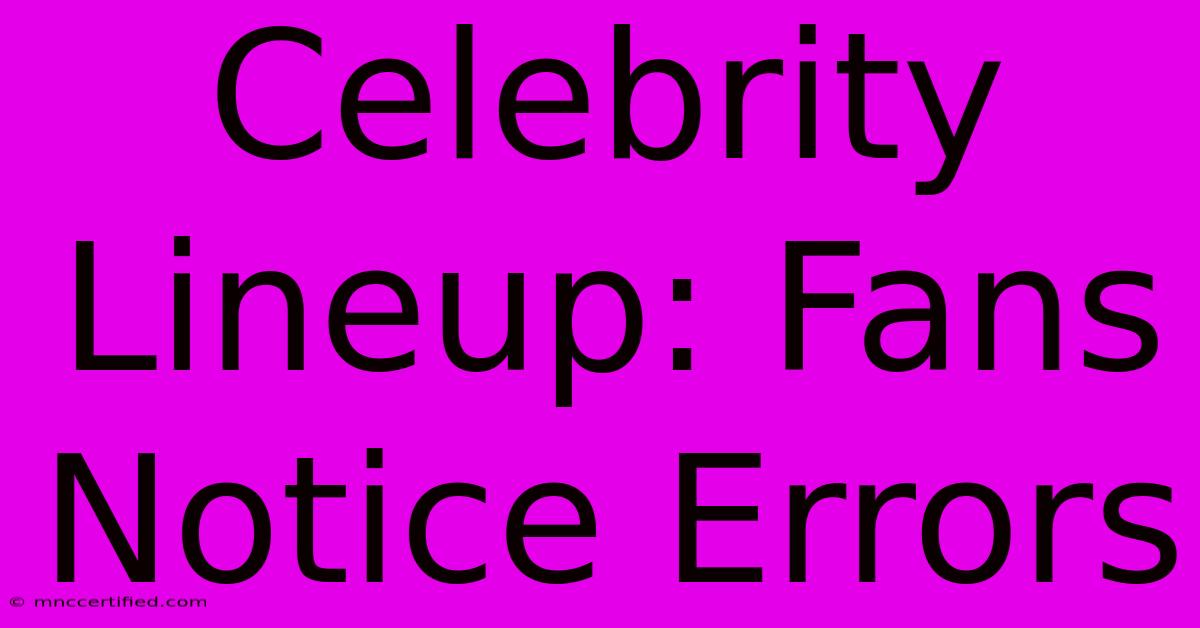Celebrity Lineup: Fans Notice Errors

Table of Contents
Celebrity Lineup: Fans Notice Errors – A Deep Dive into Social Media's Fact-Checking Power
The internet, and social media in particular, has become a powerful tool for disseminating information – and misinformation. Nowhere is this more evident than in the realm of celebrity news, where even seemingly minor details can spark viral debates. Recently, several instances of inaccurate celebrity lineup announcements have highlighted the importance of fact-checking and the crucial role fans play in correcting errors. This article delves into these incidents, exploring the reasons behind the mistakes and the impact of social media's instantaneous fact-checking capabilities.
The Rise of Misinformation in Celebrity Lineups
Announcements regarding celebrity appearances, whether at concerts, festivals, or other events, are often met with huge excitement. Social media platforms become hubs of anticipation, with fans sharing news, speculating about performances, and generally building hype. However, this very enthusiasm can be exploited by inaccurate reporting. Mistakes can stem from various sources:
- Miscommunication: Simple errors in communication between promoters, agencies, and social media managers can lead to incorrect information being disseminated widely.
- Fake News & Hoaxes: Deliberate attempts to mislead fans for various reasons (increased engagement, clickbait) contribute to the spread of false information.
- Human Error: Simple typos or factual inaccuracies in press releases or social media posts can have far-reaching consequences.
- Outdated Information: Failure to update announcements in a timely manner can result in circulating outdated or incorrect lineups.
Recent Examples of Celebrity Lineup Errors and Fan Reactions
Several recent events have showcased the prevalence of errors and the swift reaction of vigilant fans:
- The "Mystery Guest" Debacle: One particular festival faced criticism after announcing a "mystery guest" which turned out to be a significantly less popular artist than many had hoped for. This sparked a flurry of disappointed comments and highlighted the importance of transparency.
- The Double Booking Disaster: A concert announcement mistakenly listed a specific artist performing twice on the same day – a logistical impossibility that prompted a swift wave of corrections and apologies.
- The Ghosting of a Headliner: The unexpected absence of a headlining act from a major event, without prior notice, led to widespread anger and calls for refunds, demonstrating the importance of accurate, up-to-date communication.
The Power of Fan Fact-Checking
Social media empowers fans with the ability to instantly identify and correct misinformation. Fans meticulously examine announcements, cross-referencing information from official sources and leveraging their extensive knowledge of the celebrity world. This grassroots fact-checking mechanism holds those responsible for inaccurate information accountable. The rapid spread of corrections and critical comments can pressure organizers to issue retractions and prevent the further spread of false news.
Lessons Learned: Improving Accuracy in Celebrity Lineup Announcements
The instances of errors in celebrity lineup announcements underscore the need for robust fact-checking procedures across all stages of event planning and promotion. Organizers need to:
- Implement rigorous verification processes: Establish clear communication channels and multiple checkpoints to ensure accuracy before releasing information.
- Utilize reliable sources: Confirm information with reputable sources before publishing.
- Promote transparency: Be open and honest with fans about any errors and provide timely updates.
- Embrace social media monitoring: Actively monitor social media for any discrepancies or corrections reported by fans.
Conclusion: The Collaborative Nature of Truth
The incidents discussed highlight a crucial point: the fight against misinformation is a collaborative effort. While event organizers bear primary responsibility for disseminating accurate information, fans also play a vital role in identifying and correcting errors. The power of collective observation and swift correction on social media makes it a powerful tool in combating misinformation and ensures a more informed and authentic experience for fans everywhere. This ongoing interaction between event organizers and their audience is a testament to the evolving landscape of information sharing in the digital age.

Thank you for visiting our website wich cover about Celebrity Lineup: Fans Notice Errors. We hope the information provided has been useful to you. Feel free to contact us if you have any questions or need further assistance. See you next time and dont miss to bookmark.
Featured Posts
-
Fbi Cellular Analysis Survey Team
Nov 18, 2024
-
Falcons Broncos Matchup Players To Track
Nov 18, 2024
-
21 63 An Hour Is How Much A Year
Nov 18, 2024
-
Get To Know Melvin Odoom Family And Relationships
Nov 18, 2024
-
Ap Top 25 Illinois Footballs Return
Nov 18, 2024